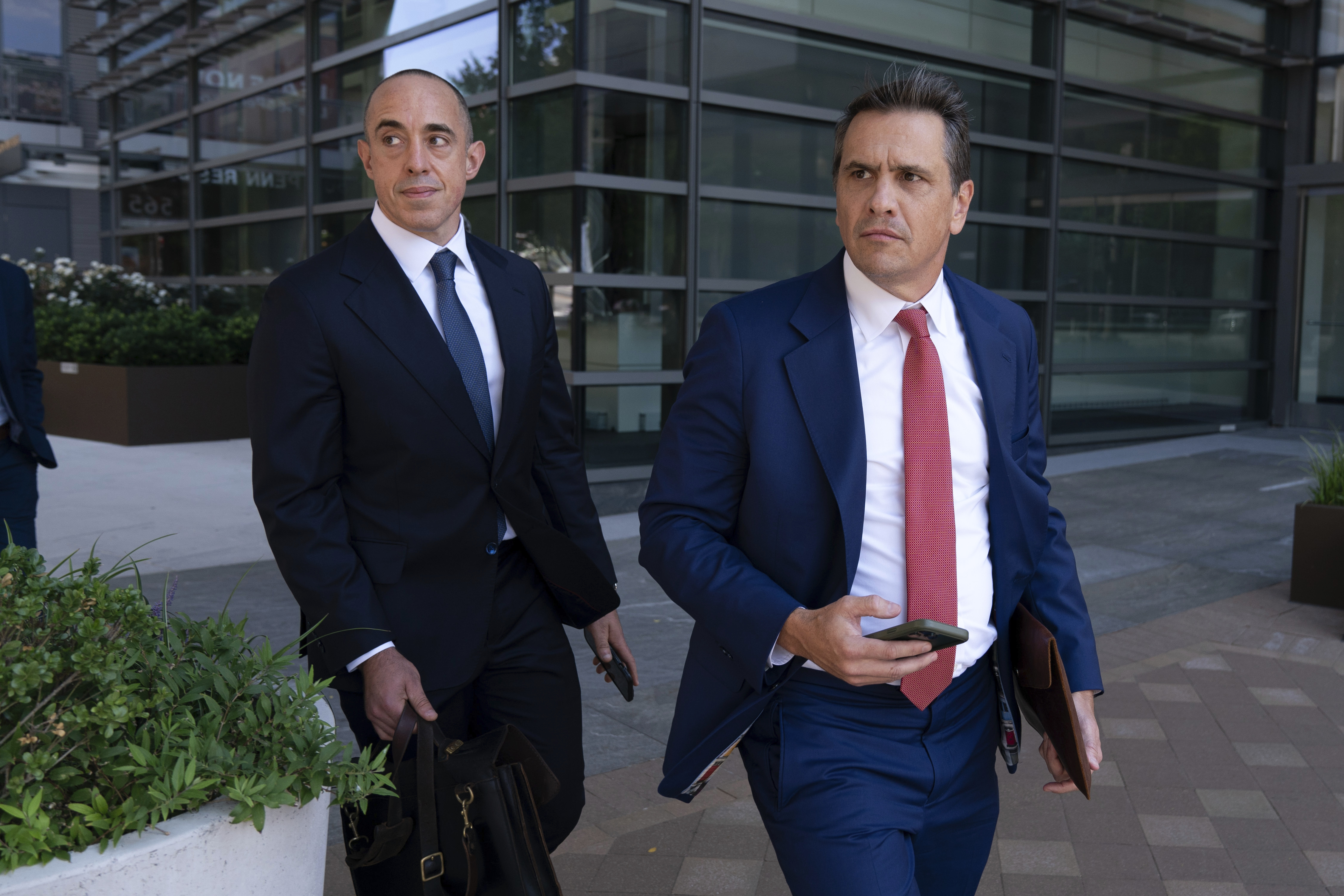Congress
The Trump judge wars are back

President Donald Trump’s first term was marked by a contentious and ultimately wildly successful campaign to overhaul the federal judiciary — one that dominated the Senate floor calendar for nearly four years straight and occasionally exploded in partisan fury.
Now, with Trump dealing with unpredictable foreign crises and a sprawling domestic policy megabill, judge nominations have been almost an afterthought in the White House and on Capitol Hill.
That changed Wednesday, when Emil Bove — Trump’s former personal lawyer, now a top Justice Department official — appeared for the Senate Judiciary Committee for a fiery hearing on his nomination to an appeals court judgeship.
The decision to nominate Bove, and the apparent willingness of Republican senators to fall in line behind him, suggests Trump is embracing a new kind of judicial pick as he continues to face significant resistance to his governing decisions in the federal courts.
Bove, 44, faced intense questioning from panel Democrats who pressed on his loyalty to the president as reflected not only in his private representation of Trump but his actions as principal associate deputy attorney general. Those include dismissing prosecutors tied to cases involving the Jan. 6 Capitol riot, ending the corruption prosecution of New York City Mayor Eric Adams and pursuing the administration’s deportation agenda.
“Bove has led the effort to weaponize the Department of Justice against the president’s enemies,” said Illinois Sen. Dick Durbin, the top Judiciary Democrat. “Having earned his stripes as a loyalist to this president, he’s been rewarded with a lifetime nomination.”
The tenor of Wednesday’s hearing suggested that there is no detente in sight in the escalating partisan fight over federal judges, which reached a crescendo in 2018 with the searing confirmation battle over Supreme Court Justice Brett Kavanaugh.
The only check on the rancor might be the fact that there are relatively few judicial vacancies for Trump to fill at the moment. According to the U.S. court system, there are just about 50 across the country, the vast majority of which are on district courts. The president’s first slate of judicial nominees, including a pick for the 6th Circuit Court of Appeals, is poised to have a vote Thursday before the Judiciary Committee.

There are, however, three Republican-appointed Supreme Court justices 70 or over who are considered possible candidates for retirement over the next three-and-a-half years. Trump’s willingness to nominate Bove — and to weather a hardball confirmation fight when a lesser-known nominee might have had an easier time — suggests he won’t hesitate to tap another loyalist when a high-court slot opens up.
With a potential lifetime appointment to the 3rd Circuit, with jurisdiction over appeals from New Jersey, Pennsylvania, Delaware, and the Virgin Islands, Bove himself could emerge as a SCOTUS short-list candidate if confirmed.
The questioning Wednesday appeared to underscore the high stakes. Democrats questioned Bove about the pardons of Jan. 6 convicts and his role in the removal of the line prosecutors who sent them to jail.
The issue was effective in sinking one prior Trump nominee: his initial pick for U.S. attorney for the District of Columbia, Ed Martin. Sen. Thom Tillis (R-N.C.), a Judiciary member up for next year, effectively tanked his chances by objecting to Martin’s comments minimizing the Capitol riot. (Tillis said Wednesday he has not yet taken a position on Bove’s nomination. “Honestly I haven’t discussed it with my staff yet,” he said.)
Democrats also seized on the Justice Department’s decision to abandon the Adams prosecution — a controversial order from Bove himself that triggered the resignation of at least 6 prosecutors in New York and Washington. In her resignation letter, then-acting Manhattan U.S. attorney Danielle Sassoon accused Bove of engaging in a corrupt deal to drop the case in exchange for the Democratic mayor’s support of Trump’s immigration policies.
Asked during the hearing to swear to his “higher being” that he didn’t make a “political deal” with Adams, Bove replied: “I swear to my higher being and on every bone in my body.”
But Bove also said that he ordered the case dismissed based on “policy considerations,” explaining that “the prosecution placed an inordinate burden on the mayor’s ability to protect the city and to campaign in an ongoing election cycle.”
Using that logic, Sen. Amy Klobuchar (D-Minn.) said, “there would be two classes of justice – one for people who are in office and one for everyone else.”
Bove also denied allegations from a former DOJ official that he suggested defying court orders for the administration’s deportation agenda.
“I am not anybody’s henchman,” Bove told senators. “I am not an enforcer. I am a lawyer from a small town who never expected to be in an arena like this.”
Republicans rallied to Bove’s defense, with the tone set early in the hearing by Judiciary Chair Chuck Grassley (R-Iowa), who noted that the nominee had seen an “intense opposition campaign” and extolled his credentials as a former prosecutor.
Democrats, on the other hand, cast the fight over Bove’s nomination as one of grave significance for the rule of law, echoing a familiar fight from Trump’s first term. Indeed, federal judges appointed by presidents of both parties have been some of the most effective checks on Trump’s power early in his second term — much to the president’s frustration.
Yet Democrats have little power to stop Trump’s nominees so long as Republican senators stick together. With a 53-vote Senate majority, GOP leaders can lose several votes and still confirm Trump’s picks with Vice President JD Vance as a tie-breaker.

Democrats also lack the benefit of the “blue slip” policy that gives home-state senators effective veto power over court nominees. Republicans abandoned the practice for circuit judges during Trump’s first term, one of the procedural changes in the Senate that allowed the party to confirm hundreds of judicial nominees during those four years. Democrats maintained the practice after they won control of the Senate and Joe Biden won the presidency.
Among those attending Wednesday’s hearing were Attorney General Pam Bondi and Deputy Attorney General Todd Blanche — Bove’s supervisors at the Justice Department. Blanche and Bove worked together as Trump’s criminal defense attorneys, including during last year’s criminal trial that resulted in his conviction on 34 felony counts of business fraud. Bondi defended Trump during his first impeachment trial.
Sen. Richard Blumenthal (D-Conn.) contended that Bondi and Blanche attended for the sole purpose of “whip[ping] the Republicans into shape, to make sure that they toe the line.”
“They were there to send a message to Republicans: We are watching you,” Blumenthal said during a news conference after Bove’s testimony. “They were there to watch members of this committee, the Republicans, whom they expect simply to fall into line.”
Bove wasn’t the only Trump nominee answering questions about his loyalty to the president Wednesday. Edward L. Artau, one of four district court nominees to also appear before Senate Judiciary members, was asked by Blumenthal why he did not recuse himself from a case involving Trump after he began lobbying for a federal judgeship.
Blue Light News previously reported that Artau, a state judge, was lobbying for a seat on the federal bench while he sat on a three-judge panel in Trump’s defamation case against the board of the Pulitzer Prizes.
Asked by Blumenthal why he did not recuse himself, Artau maintained that he abided by the relevant judicial conduct rule. He said he did know he was under consideration from the White House at the time he wrote the opinion.
“Had the timing been differently, then I may have handled it differently,” Artau said.
Calen Razor contributed to this report.
Congress
Comer threatens the Clintons with contempt for refusing to be deposed in Epstein probe
House Oversight Committee Chair James Comer has threatened to pursue contempt charges against former President Bill Clinton and former Secretary of State Hillary Clinton if they do not sit for depositions in Congress’ probe of the Jeffrey Epstein investigation.
His warning Friday came after the committee released new photos from the estate of the late convicted sex offender, including a signed photo depicting the former president smiling alongside Epstein and Ghislaine Maxwell, who is serving 20 years in prison for her role in his child sex trafficking operation.
Comer excoriated the Clintons in a statement for apparently refusing to participate in the investigation. The House Oversight Committee subpoenaed the Clintons in August, and has requested they sit for depositions next week.
“It has been more than four months since Bill and Hillary Clinton were subpoenaed to sit for depositions related to our investigation into Jeffrey Epstein and Ghislaine Maxwell’s horrific crimes. Throughout that time, the former President and former Secretary of State have delayed, obstructed, and largely ignored the Committee staff’s efforts to schedule their testimony,” Comer said.
He said the House Oversight Committee will seek to hold both Clintons in contempt of Congress if they do not appear for depositions or reschedule in the coming weeks. Comer scheduled Bill Clinton’s deposition for Wednesday and Hillary Clinton’s deposition for Thursday.
“If the Clintons fail to appear for their depositions next week or schedule a date for early January, the Oversight Committee will begin contempt of Congress proceedings to hold them accountable,” said the statement.
Bill Clinton’s ties to Epstein have been publicly known for years. His association included traveling on Epstein’s private plane after he left office. A spokesperson for the former president has said he cut off ties with Epstein prior to his 2019 arrest and was unaware of Epstein’s alleged crimes.
Congress
House GOP leaders race to release health care package Friday
House Republican leaders are rushing to release a new health care package Friday, but a morning meeting with members of key GOP faction led unsettled whether to allow a floor vote on extending expiring Obamacare tax credits.
Speaker Mike Johnson and other members of his leadership team want to file text of the health care legislation as soon as possible in order to comply with House notice requirements and prepare it to be take up by the House Rules Committee early next week. But the matter has been held up as they negotiate with conservative hard-liners who are wary of teeing up a vote to extend the expiring insurance subsidies.
“This is going to be a great piece of legislation that everyone will be united around,” Johnson told reporters after the meeting.
The core package is expected to include an expansion of health savings accounts and association health plans, as well as funding for cost-sharing reductions that help low-income Obamacare enrollees afford their plans. But moderate House Republicans want an amendment vote to add what is likely to be a two-year extension of the enhanced tax credits that were enacted by Democrats during the Covid pandemic and are set to expire on Dec. 31.
GOP leaders had been planning to let the subsidies expire, but they are now inclined to allow a floor amendment on an extension, according to four people granted anonymity to describe the closed-door Friday morning meeting with Johnson and a swath of senior Republicans.
Conservatives, including Budget Chair Jodey Arrington (R-Texas), have strongly objected to any attempt to continue the tax credits.
“I pity the Republican that has to explain why they would propagate or perpetuate, I should say, a fraud-ridden subsidy from the Covid era to prop up a failed health care program,” Arrington said Friday, saying it would make Republicans “complicit in propping up the very driver” of rising health care costs.
But he suggested a vote on an extension would happen regardless: “I expect people are going to have an opportunity to vote their conscience and then go defend their votes back home like we always do.”
House Majority Leader Steve Scalise said the topic was “heavily discussed” in the meeting, which another senior House Republican described as “lively.” Leaving the session, Scalise said leaders would be “making final decisions shortly, because we have to file text later today.”
Benjamin Guggenheim and Nicholas Wu contributed to this report.
Congress
Trump, Clinton, Gates included in Epstein photo trove
Photos from the estate of Jeffrey Epstein tie the late, convicted sex offender to President Donald Trump, former President Bill Clinton, tech billionaire Bill Gates and former Treasury Secretary Larry Summers.
These men and others are featured in the roughly 95,000 photos the House Oversight and Government Reform Committee has received from the Epstein estate as part of its ongoing investigation. House Democrats publicly released select 19 photos Friday morning.
“It is time to end this White House cover-up and bring justice to the survivors of Jeffrey Epstein and his powerful friends,” said the Oversight Committee’s top Democrat, Rep. Robert Garcia of California, in a statement. “These disturbing photos raise even more questions about Epstein and his relationships with some of the most powerful men in the world. We will not rest until the American people get the truth. The Department of Justice must release all the files, NOW.”
The White House and other individuals in the photographs beyond Trump did not immediately respond to requests for comment.
The Justice Department is required to release the full tranche of Epstein-related documents by Dec. 19, per the terms of legislation Congress passed last month.
Of the photos shared Friday, one features Trump alongside someone who appears to be a young woman (her face has been redacted). Another shows Trump standing beside Epstein, chatting with a woman, while a third has Trump grinning among a half dozen women whose faces have also been redacted. In that shot, he appears to have his arm around one women’s waist.
There is another photo in the tranche showing pictures of “Trump condoms” being sold for $4.50 each, branded with the words, “I’M HUUUUGE!”
There is a signed photo from Clinton depicting him smiling alongside Epstein and Epstein’s associate Ghislaine Maxwell, who is serving 20 years for her part in the sex trafficking scheme.
The images underscore Epstein’s long and storied network of connections to powerful men across industries, from filmmaker Woody Allen to conservative strategist Steve Bannon. They were sent to Capitol Hill after a subpoena from the Oversight panel for materials from the late financier’s estate, separate from the documents demanded from the Justice Department by legislation.
While Epstein’s connections with these public figures are far from new revelations, they highlight the extent to which Epstein reveled in his relationships with powerful people.
Gates, the Microsoft founder, is seen smiling at Andrew Mountbatten-Windsor, formerly known as Prince Andrew, in one photo and grinning beside a pilot in front of a plane in another. That photo has been published previously.
Summers, the former Treasury Secretary and president of Harvard University, is the latest public figure to face fallout from his relationship with Epstein. In wake of new materials produced in response to the congressional investigation, Summers was banned from the American Economic Association and stepped back from his roles at Harvard.
Summers is seen in one photo on what appears to be a small plane.
Bannon, who served as Trump’s chief strategist during his first term, is seen in the photos talking with Epstein at a desk and standing beside Epstein in front of a mirror, posing for a selfie. In another, Bannon appears to be speaking with Allen.
Trump has maintained that he ended his relationship with Epstein years ago and called the efforts clamoring for the release of the files a “hoax.” In a pivot last month, he gave congressional Republicans his nod of approval to vote to release the Epstein files and swiftly signed the legislation into law.
Those files are due in the coming days, after courts cleared the way for the Justice Department to release grand jury materials and the 30-day clock for Attorney General Pam Bondi to make the contents public is winding down. A Justice Department spokesperson did not immediately respond to a request for comment.
Clinton, meanwhile, has been subpoenaed by the Oversight panel, but a date has not yet been scheduled for his testimony to Congressional investigators. Trump has ordered Bondi to investigate Democrats with ties to Epstein, including Clinton and Summers. Bondi asked Jay Clayton, U.S. attorney in the Southern District of New York, to lead the charge.
-

 Politics10 months ago
Politics10 months agoFormer ‘Squad’ members launching ‘Bowman and Bush’ YouTube show
-

 The Dictatorship10 months ago
The Dictatorship10 months agoPete Hegseth’s tenure at the Pentagon goes from bad to worse
-
Uncategorized1 year ago
Bob Good to step down as Freedom Caucus chair this week
-

 Politics10 months ago
Politics10 months agoBlue Light News’s Editorial Director Ryan Hutchins speaks at Blue Light News’s 2025 Governors Summit
-

 The Dictatorship10 months ago
The Dictatorship10 months agoLuigi Mangione acknowledges public support in first official statement since arrest
-

 The Josh Fourrier Show1 year ago
The Josh Fourrier Show1 year agoDOOMSDAY: Trump won, now what?
-

 Politics8 months ago
Politics8 months agoDemocrat challenging Joni Ernst: I want to ‘tear down’ party, ‘build it back up’
-

 Politics10 months ago
Politics10 months agoFormer Kentucky AG Daniel Cameron launches Senate bid





